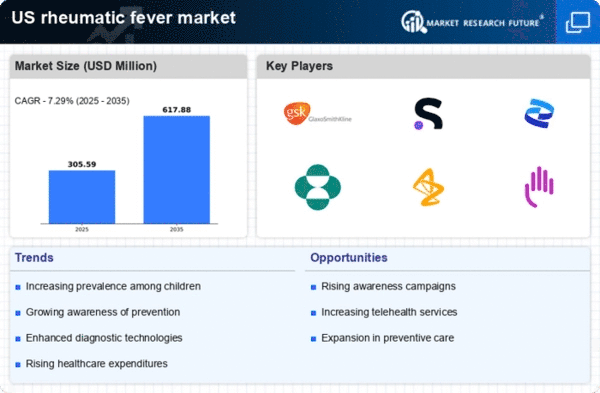Growing Public Health Awareness
Growing public health awareness regarding rheumatic fever is significantly impacting the rheumatic fever market. Educational campaigns aimed at parents and caregivers are emphasizing the importance of recognizing symptoms and seeking prompt medical attention. This increased awareness is likely to lead to earlier diagnosis and treatment, which can mitigate the long-term consequences of the disease. Moreover, community health initiatives are fostering collaboration between healthcare providers and local organizations to promote preventive measures. As the public becomes more informed about the risks associated with rheumatic fever, the demand for healthcare services and interventions is expected to rise, thereby propelling the growth of the rheumatic fever market.
Government Initiatives and Funding
Government initiatives aimed at combating rheumatic fever are significantly influencing the rheumatic fever market. Various public health campaigns have been launched to educate communities about the importance of early detection and treatment of streptococcal infections. Additionally, funding for research and development of new therapeutic options is on the rise, with federal and state governments allocating millions of dollars to support innovative solutions. For instance, the Centers for Disease Control and Prevention (CDC) has implemented programs to enhance surveillance and promote preventive measures. This financial backing not only fosters advancements in treatment but also encourages collaboration among healthcare providers, researchers, and policymakers, thereby creating a more robust rheumatic fever market.
Increased Research and Development
The surge in research and development activities focused on rheumatic fever is a pivotal driver for the rheumatic fever market. Academic institutions and pharmaceutical companies are investing heavily in understanding the pathophysiology of rheumatic fever and exploring novel therapeutic approaches. Recent studies have highlighted the genetic predisposition to rheumatic fever, opening new avenues for targeted therapies. This influx of research not only aims to improve treatment options but also seeks to develop effective preventive strategies. As a result, the rheumatic fever market is likely to expand, driven by the continuous quest for innovative solutions to combat this disease.
Rising Incidence of Rheumatic Fever
The increasing incidence of rheumatic fever in the US is a critical driver for the rheumatic fever market. Recent data indicates that approximately 200,000 cases occur annually, primarily affecting children aged 5 to 15 years. This rise is attributed to factors such as inadequate access to healthcare and the prevalence of streptococcal infections. As awareness grows regarding the long-term complications associated with rheumatic fever, including rheumatic heart disease, there is a heightened demand for effective treatment options. Consequently, healthcare providers are focusing on early diagnosis and intervention, which is likely to stimulate growth in the rheumatic fever market. The need for improved healthcare infrastructure and access to preventive measures further underscores the urgency of addressing this public health issue.
Technological Advancements in Treatment
Technological advancements in treatment modalities are reshaping the rheumatic fever market. Innovations in pharmaceuticals, such as the development of new antibiotics and anti-inflammatory medications, are enhancing treatment efficacy. Furthermore, the introduction of telemedicine has improved access to healthcare for patients in remote areas, allowing for timely diagnosis and management of rheumatic fever. The market is witnessing a shift towards personalized medicine, where treatments are tailored to individual patient needs, potentially improving outcomes. As these technologies continue to evolve, they are likely to drive growth in the rheumatic fever market, making it imperative for stakeholders to stay abreast of these developments.

















